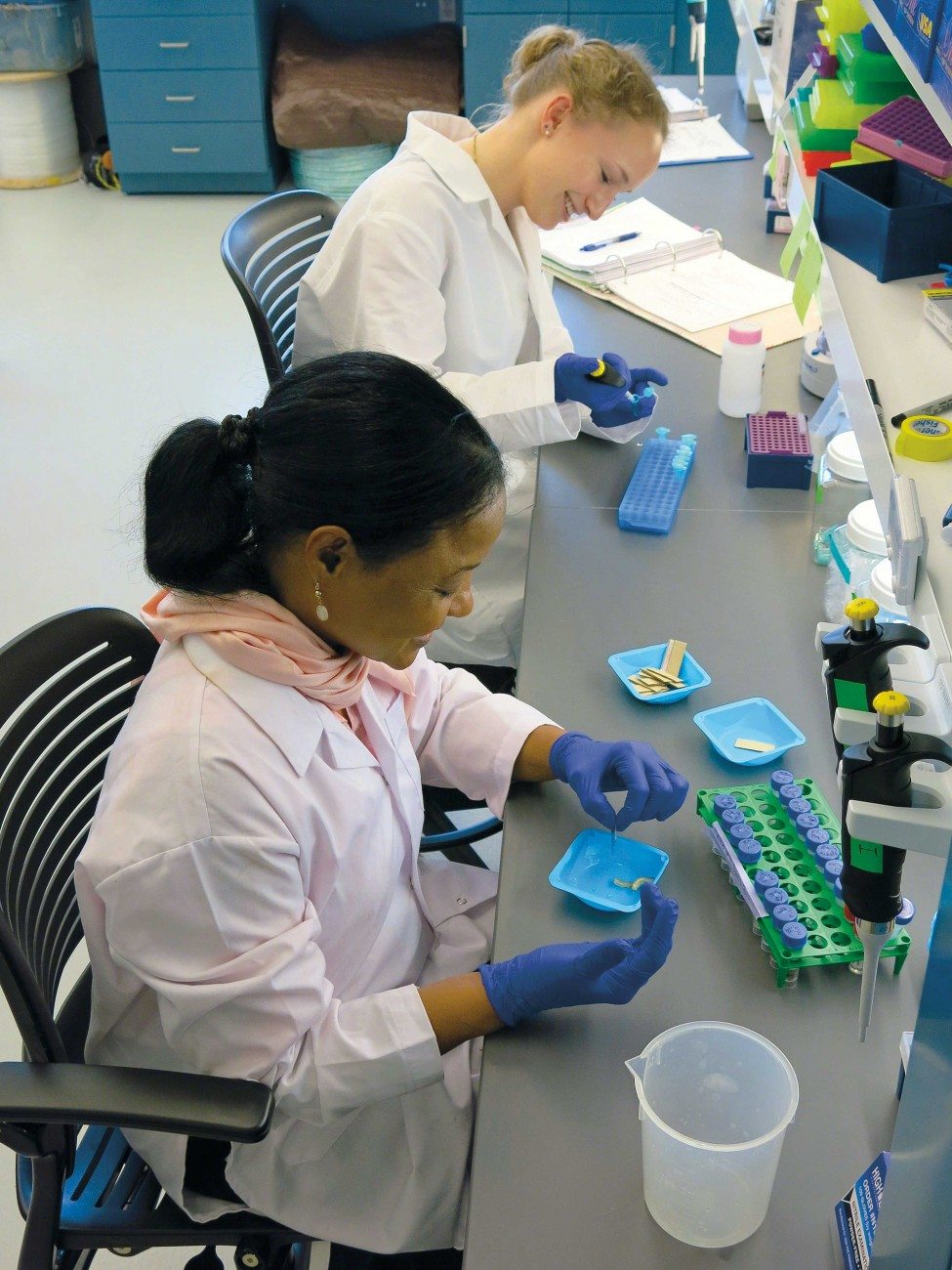Sharing samples and knowledge for global shark conservation
Enthusiasm for sharks and interest in their biology transcend international boundaries and cultures, as Cassandra Ruck discovers when she welcomes Igbal Elhassan to the Shark Research Center in Florida.
Photo by Michael Scholl
The day was Friday, 9 January 2015. After battling traffic for an hour, finding the correct parking garage and navigating to the terminal, it was time to find a place to ‘chill out’. If you’ve ever driven in Miami on the infamously crowded I-95 freeway, you will understand that this is quite a feat for a native New Englander who had never been to Miami International Airport. Thankfully, I had a great co-pilot in Cristín Fitzpatrick, my lab mate at the SOSF Shark Research Center. We found a restaurant not too far from the terminal and plopped down at the bar. I sat there munching on chips and guacamole while awaiting the arrival of a woman, Igbal Elhassan, whom I had only met via e-mail. All I knew was that Igbal was from Sudan, was pursuing her PhD, had sampled thousands of sharks from the Arabian and Red seas in dozens of remote fishing villages, and was visiting the USA for the first time. She had been described to me as ‘a remarkable woman’.
Finally, after a few flight delays and three hours at Chili’s, Cristín and I were able to greet our new colleague. Igbal walked into the terminal with a huge smile and hugged us warmly. We located her belongings, which had arrived on an earlier flight without her, and ultimately made it back to her home away from home: Hollywood, Florida.
On Monday we got straight to work. With an MSc in fisheries, Igbal found herself in the completely new territory of conservation genetics. Like the spirited woman she is, she came to her new scientific environment with perseverance, enthusiasm and a keen interest to learn genetics lab and statistical methods. Our goal in this collaboration was to provide her with the experience and training that would enable her not only to pursue her PhD, but also to return home with knowledge she could pass on to students in her home institution, the University of Bahri in Sudan. Heavy sanctions limit the resources of Sudanese scientists and it is vital for them to travel internationally to gain skills and knowledge that they can bring home and share.
In order to give Igbal a fully immersive experience, the SOSF Shark Research Center team of Dr Andrea Bernard, Cristín, Reggie Williams, Megan Earney and myself got started on the samples Igbal had painstakingly collected from fishery landing sites and began working on projects to train her in genetics and contribute to her PhD. We chose to conduct a population genetics study on the spinner shark Carcharhinus brevipinna. An important coastal species with a global distribution, the spinner shark is a target of both recreational and commercial fisheries. It takes its name from a peculiar behaviour: bursting from the water and spinning in the air one, two, even three times before falling back with a splash. The spinner shark closely resembles the blacktip shark Carcharhinus limbatus, the main visible difference being a black spot on the anal fin that the spinner has and the blacktip lacks. It’s a small difference and the two species are often confused – spinner meat is often sold as blacktip meat – but thankfully genetics can always tell the difference, even if only from body parts!
SOSF Shark Research Center
The SOSF Shark Research Centre (SOSF-SRC) is located in Florida and was established at Nova Southeastern University in 2009 by directive of the founder of the Save Our Seas Foundation.
The centre focuses mainly on scientific research aimed at increasing knowledge to aid the conservation, management and understanding of sharks and rays worldwide.
A hallmark of the SOSF-SRC is that it specialises in taking integrative, multi-disciplinary approaches to research and conservation, which include combining high-tech genetics, genomics and field work to illuminate holistically aspects of shark and ray science that would be difficult to decipher using single-discipline approaches alone.
The SOSF-SRC also serves as an academic unit within Nova Southeastern University and as such its function includes the training of students from around the world in marine research and conservation. Although advanced scientific research is the main focus of the SOSF-SRC, our staff also undertake educational and outreach activities involving primary (US middle) and secondary (US high) school students.

